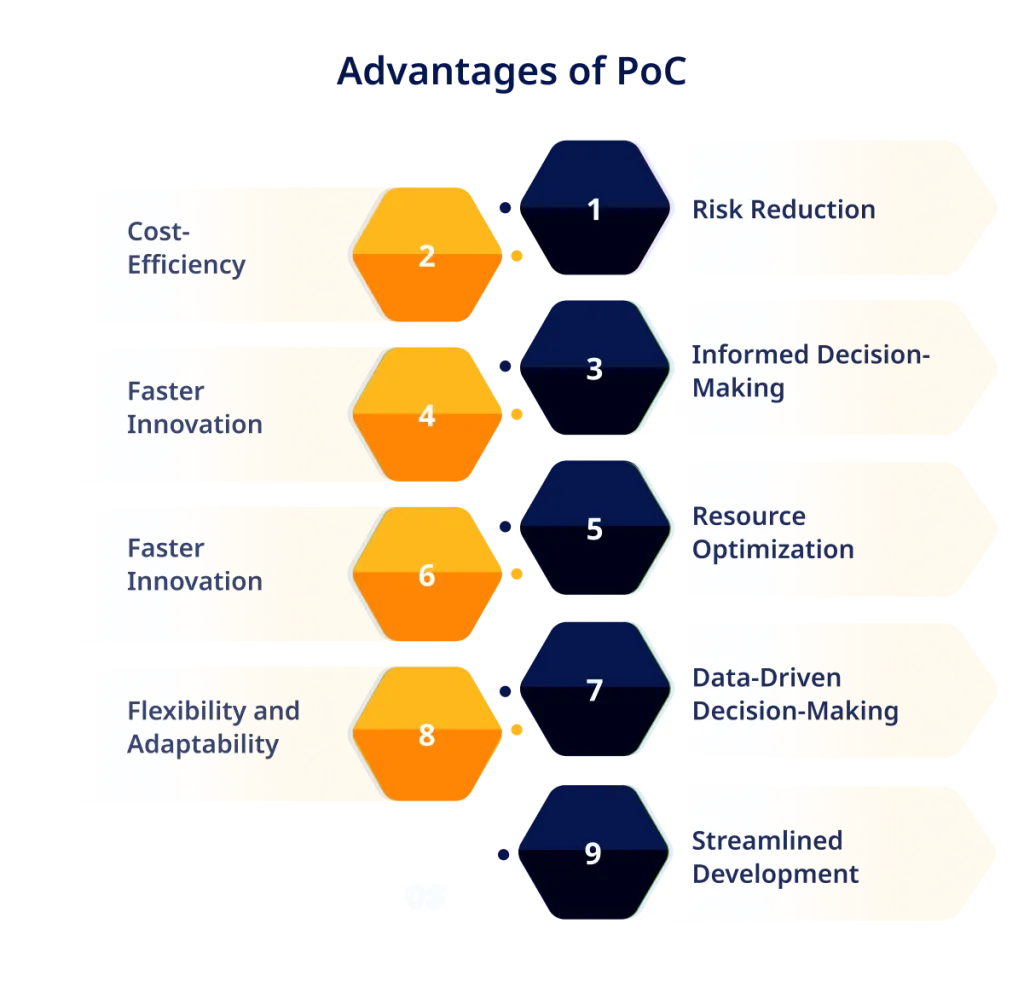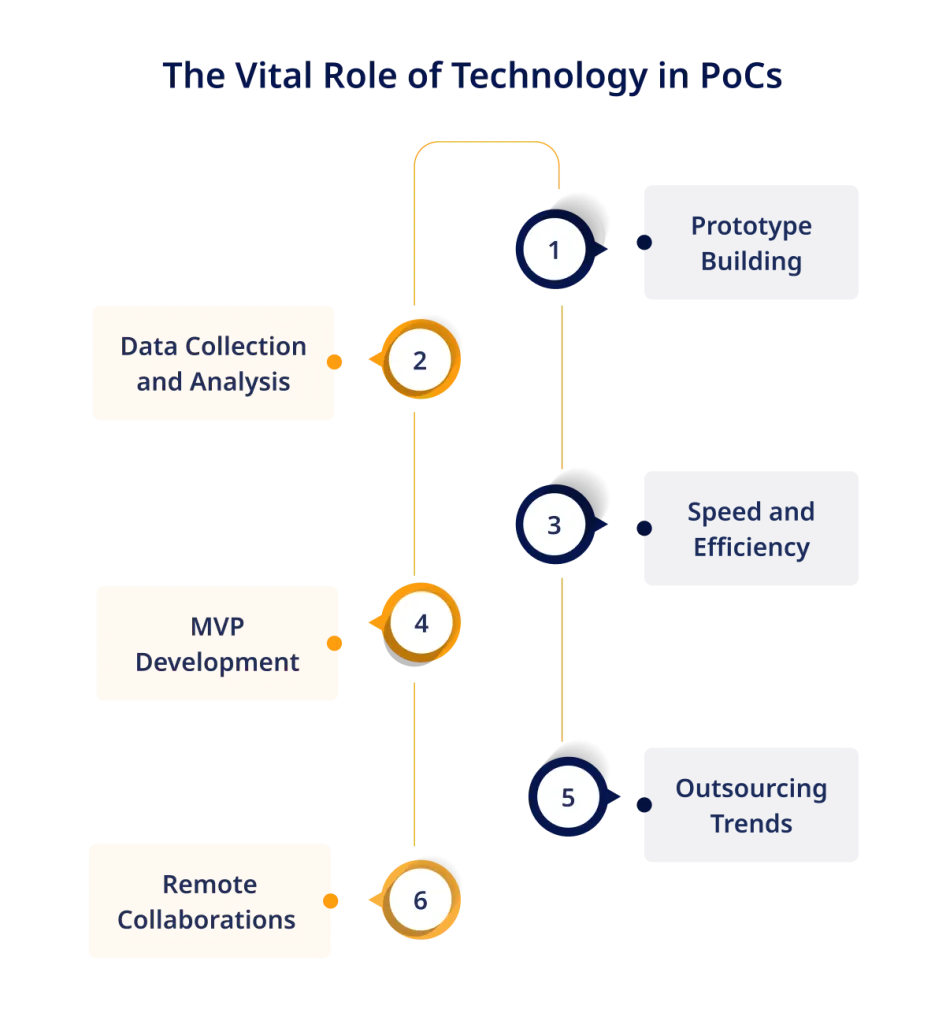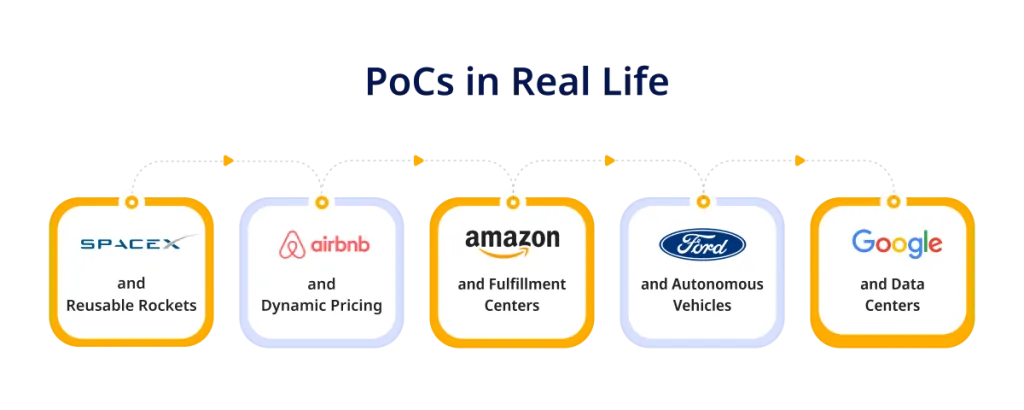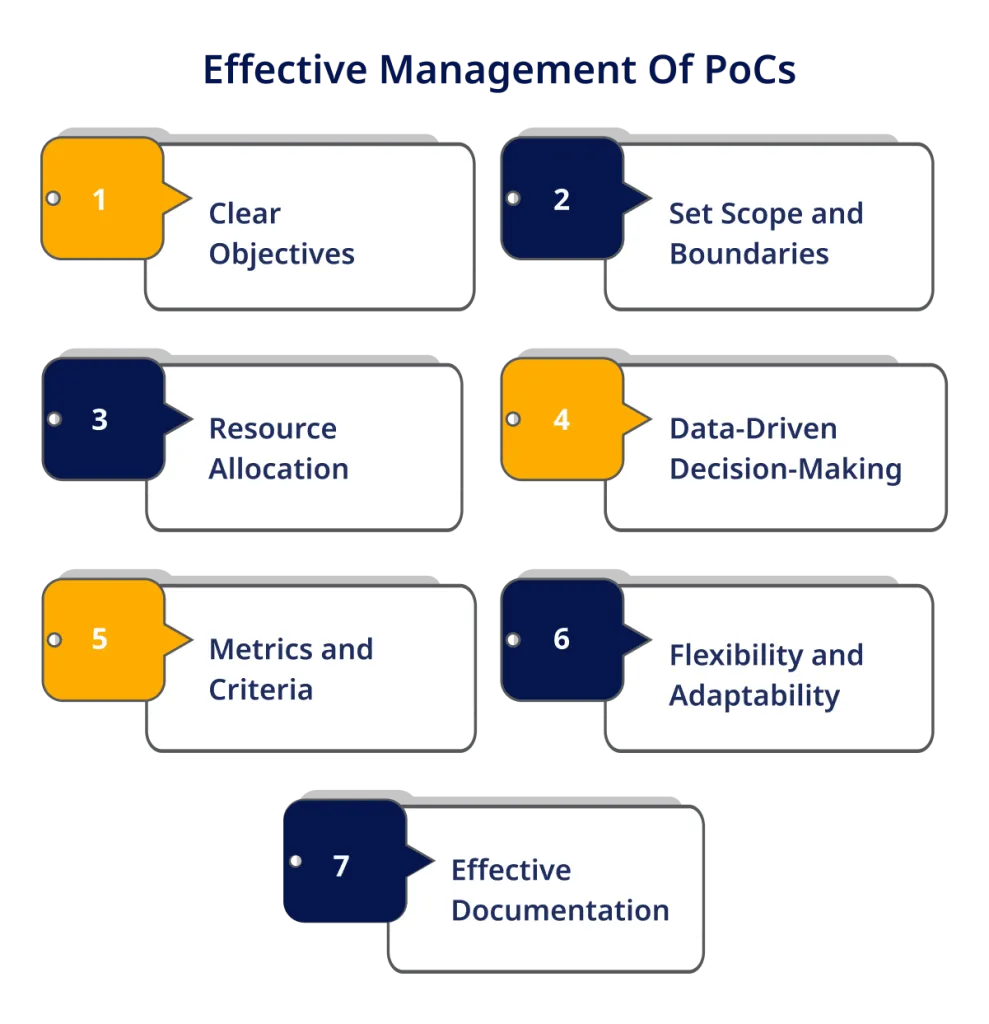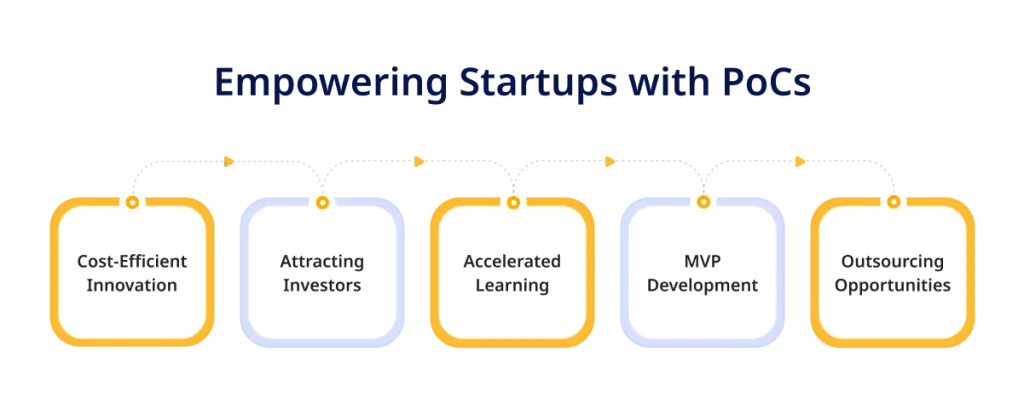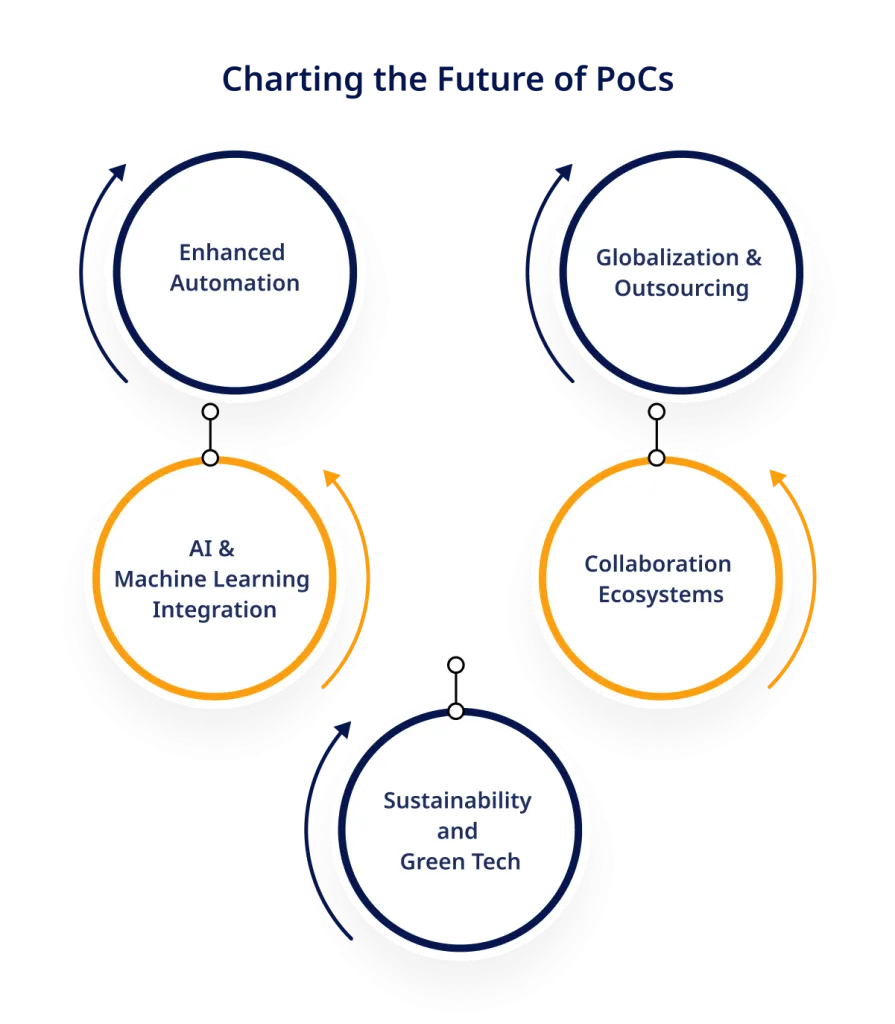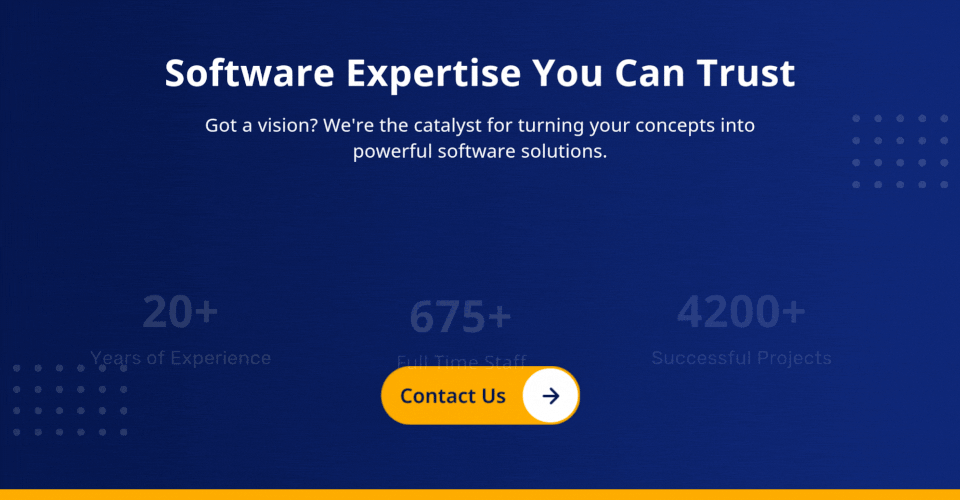Before diving into major software product development or investments, companies need ways to validate capabilities, de-risk assumptions, and guide development.
One of the best ways to ensure that is PoCs. Proof of Concept (PoC) is a key mechanism for proving proposed solutions through targeted prototypes before overcommitting resources and budgets.
Companies that use proof of concepts gain 40% faster user adoption of new solutions (Gartner).
What are Proof of Concept Projects?
In essence, PoCs involve building limited functionality software models focused on high-priority features or use cases.
These prototypes test technology viability, integration complexity, UX designs, and other elements representing the biggest unknowns or risks.
In this guide, we unpack everything technology and business teams need to know to extract maximum value from proof-of-concept projects, such as:
- The best practices on PoC scoping
- Criteria for bringing on experienced development talent
So, let’s explore how targeted PoCs provide the clarity and confidence needed to drive software investments forward, backed by real-world evidence.
Trust us to build a PoC that addresses your unique challenges and sets the stage for successful project execution.
Everything You Need to Know About Proof of Concept (PoC)
To understand PoC, let’s understand the definition of PoC and its significance.
Proof of Concept, often abbreviated as PoC, is a fundamental step in testing the feasibility of an idea or a new technology.
The term “Proof of Concept” might sound complex, but it’s not.
Consider it as a practical test drive for new ideas or technologies. It’s all about ensuring something works before you commit many resources. This will help you save software development costs and time.
1. Testing the Waters: When you have a fresh idea or a new piece of technology, it’s natural to be cautious. A PoC helps you identify and address potential hiccups or glitches early on.
2. Feasibility Check: You want to know if your brilliant plan can be turned into a real thing. A PoC helps you figure out if it’s doable. It enables you to identify: “Can this idea really work?”
3. Baby Steps: It’s like taking baby steps. Instead of going all-in, you take a small step to see if you’re headed in the right direction.
4. Avoiding Costly Mistakes: Imagine building a whole software project without knowing if it’ll work. That could be super expensive. A PoC helps you avoid such financial mishaps.
Understanding the Power of Proof of Concept (PoC) in Business
Technology plays a pivotal role in determining the success of a company. To stay ahead of the competition, organizations must adopt new technologies and ideas.
However, embracing innovation comes with inherent risks and uncertainties. This is where the concept of Proof of Concept (PoC) steps in.
At its core, a Proof of Concept (PoC) is a critical phase in the journey from idea to implementation. For businesses, PoCs serve as a strategic tool to mitigate risk when introducing something new.
They help in decision-making and provide insights into whether an idea is worth investing in. With PoCs, organizations can ensure they’re on the right track before making substantial financial commitments.
Also Read: Difference Between Proof of Value & Proof of Concept
Why PoCs Matter: Their Impact on Decision-Making
Proof of Concepts (PoCs) are like your trusted advisors when making big decisions in software development.
Let’s find out why they matter so much:
1. Risk Mitigation: PoCs help reduce risks associated with new ideas or technologies. According to Deloitte, 61% of companies report proof of concepts reduced the risks associated with integration and scalability. Thus, before you take the plunge, PoCs provide a safety net to test the waters.
2. Informed Decisions: Making decisions based on solid evidence is always a smart move. PoCs offer concrete data and insights, so you’re not just guessing, especially if you have a dedicated development team.
3. Cost-Effective Planning: They prevent costly mistakes. Imagine spending a fortune on a software project that doesn’t work. PoCs save you from that nightmare.
4. Focusing Resources: With limited resources, it’s crucial to use them wisely. PoCs let you concentrate your efforts where they matter most.
5. Faster Progress: Waiting for a full-scale project to realize it’s a flop can be a huge setback. PoCs are like a shortcut to success. You can pivot early and get things right sooner.
ValueCoders' PoC solutions help businesses minimize risk and maximize success.
Overcoming Technical Challenges and Best Practices
While Proof of Concept (PoCs) is a powerful tool, it comes with technical challenges. Here’s how to tackle them with best practices:
1. Technology Compatibility: Ensure that the technology you’re testing is compatible with your existing systems. Compatibility issues can derail a PoC.
2. Data Security: Protect your data. Security is paramount. Implement safeguards to keep your data safe during the PoC.
3. Scalability Planning: Think about the future. Your PoC may work well in a small-scale test, but what about when you need to scale up? Plan for scalability.
4. Resource Management: Efficiently allocate resources. Ensure you have the right people with the right skills for your PoC.
5. Clear Documentation: Keep records. Detailed documentation of your PoC process is invaluable for troubleshooting and future reference.
6. Testing Real-World Scenarios: Don’t limit your tests to ideal conditions. Real-world scenarios may introduce complexities you need to address.
7. Continuous Monitoring: Stay vigilant. Continuously monitor the PoC to catch and address any issues promptly.
By following these best practices, you can navigate the technical challenges that often arise during the PoC phase.
If you are confused between diverse options, read our blog post on POC, MVP, Or Prototype: Decoding The Ideal Launchpad For Your Business Triumph. It will help make the right decision.
Remember, PoCs are about learning and refining your idea. Don’t be discouraged by challenges; use them as stepping stones to succeed.
Real World Success Stories
The power of Proof of Concepts (PoCs) shines brightest when you see how they’ve transformed real-world scenarios.
Here are some remarkable success stories to give you a glimpse of the power of Proof of Concept (PoC) and why it is essential for software product development.
1. SpaceX and Reusable Rockets
SpaceX, led by Elon Musk, used PoCs to develop reusable rockets. By experimenting with various software development models, they achieved a game-changing breakthrough. Reusable rockets not only reduce costs significantly but also revolutionize space exploration.
2. Airbnb and Dynamic Pricing
Airbnb leveraged PoCs to enhance its software development model. They tested dynamic pricing algorithms, which adjusted room rates based on demand and supply. This optimization not only boosted revenue for hosts but also provided travelers with better options, transforming the hospitality industry.
3. Amazon and Fulfillment Centers
Amazon’s success story includes the use of PoCs in optimizing their fulfillment centers. By experimenting with different software development models, they improved logistics and reduced delivery times, enhancing customer satisfaction and cutting operational costs.
4. Ford and Autonomous Vehicles
Ford utilized PoCs in the development of autonomous vehicles. These experiments allowed them to refine their software models, making self-driving cars safer and more efficient. The result is poised to revolutionize transportation and reduce accidents.
Learn how ValueCoders can help you test and validate your business ideas.
5. Google and Data Centers
Google’s commitment to sustainability involved PoCs to design energy-efficient data centers. By experimenting with various software development models, they reduced energy consumption and set a green standard for the industry, all while cutting operational costs.
Managing PoC Projects Effectively
Effectively managing a Proof of Concept (PoC) project can be the difference between success and wasted effort.
Let’s explore how to navigate this crucial phase with finesse:
1. Clearly Define Objectives: Start with a crystal-clear understanding of what you want to achieve with your PoC. Knowing the “what” and “why” is your foundation for success.
2. Set Boundaries and Scope: Define the scope of your PoC. What are you testing, and what are you not? Clearly delineate your project’s boundaries to avoid scope creep.
3. Resource Allocation: Properly allocate resources, whether it’s human capital, time, or technology. Having the right team with the right skills is essential.
4. Data-Driven Approach: Develop a plan for data collection and analysis. Know how you’ll gather the right data to measure success.
5. Define Metrics and Criteria: Establish metrics and success criteria. What does success look like? Make it measurable and specific.
6. Flexibility and Adaptability: Be flexible and ready to adapt. Only some things go as planned, so having the agility to pivot is essential.
7. Effective Documentation: Keep detailed records of the entire process. Proper documentation is invaluable for learning, troubleshooting, and future reference.
PoC for Startups, SMEs, and Innovators
Proof of Concepts (PoC) isn’t just for the big players. It offers invaluable opportunities for startups, small and medium enterprises (SMEs), and innovators.
Let’s explore how PoC can benefit these dynamic ventures:
1. Cost-Efficient Innovation: PoC allows startups and SMEs to test their groundbreaking ideas without breaking the bank. You can explore innovative concepts without committing to a full-scale project upfront.
2. Attracting Investors: For startups, a well-executed PoC can be a powerful tool to attract investors. It demonstrates that your idea is not just a dream but a tangible, feasible concept.
3. Accelerated Learning: Innovators can use PoCs to learn and refine their ideas quickly. It’s like a fast-track to gaining insights and perfecting their concepts.
4. MVP Development: Many startups aim to develop a Minimum Viable Product (MVP). A PoC is a precursor to this, helping you build a solid foundation for your MVP. Consider having MVP development service to ensure the efficiency.
5. Outsourcing Opportunities: With the trend of software development outsourcing, startups and SMEs can leverage external expertise to execute their PoCs cost-effectively. This opens doors for collaboration and innovation.
PoC offers startups and innovators a chance to compete with industry giants.
They’re more than just tests; they’re invaluable tools for bringing your groundbreaking ideas to life.
Learn how ValueCoders' PoC services can make your innovation journey smoother.
MVP Software Development
MVP stands for “Minimum Viable Product.” It’s a pivotal concept transforming how software solutions are created and delivered. Here’s why it matters:
What is Minimum Viable Product in Software Development?
MVP in software development embodies the principle of creating the simplest version of a product with just enough features to address the core problem or meet essential user needs.
It’s not the final product but a testing ground to gather user feedback and validate assumptions.
MVP allows for faster development and release, getting a product into the hands of users sooner.
- An MVP typically includes only the most essential features that make the product functional and useful.
- It’s designed to address a specific problem or need, demonstrating a solution’s viability.
- MVP serves as a starting point for iterations and improvements based on user feedback.
How is MVP different from PoC (Proof of Concept)?
The primary purpose of an MVP is to provide a functional version of a product that solves a specific problem or addresses user needs.
It is intended for real users and serves as the basis for future iterations and improvements.
A PoC, on the other hand, aims to demonstrate the feasibility of a concept or idea.
It’s a preliminary test to see if an idea can be practically implemented, often without a complete, user-ready product.
Why is MVP Important?
- User-Centric: MVP focuses on what users truly need and want, leading to a product that aligns with their preferences.
- Risk Reduction: By releasing a minimal version first, you minimize the risk of investing heavily in a product that may not succeed in the market.
- Cost-Effective: Developing an MVP is more cost-effective than building a full-fledged product, making it an attractive choice for startups and established businesses.
By beginning with the minimum viable product, you can ensure that your final product is both well-aligned with user expectations and more likely to succeed in the market.
The Future of PoC
The future of Proof of Concepts (PoC) holds exciting opportunities and trends that is set to reshape how businesses and innovators operate:
1. Enhanced Automation: PoCs will increasingly leverage automation, making testing and data collection more efficient. This will save time and resources, especially in complex projects.
2. AI and Machine Learning Integration: The integration of AI and machine learning will become common in PoCs. These technologies will provide more accurate data analysis, enabling better decision-making.
3. Sustainability and Green Tech: PoCs will play a pivotal role in sustainable practices. From green tech innovations to resource-efficient processes, PoCs will drive sustainability in various industries.
4. Collaboration Ecosystems: PoCs will foster more extensive collaboration ecosystems. Startups, SMEs, and larger companies will form partnerships to co-create innovative solutions.
5. Globalization and Outsourcing: The software development outsourcing trends will continue to grow. PoCs will facilitate global collaborations, allowing organizations to tap into a diverse talent pool.
As PoCs evolve, they are poised to become more accessible and effective tools for businesses and innovators.
They will continue to enable cost-effective software development and faster decision-making, ultimately reshaping industries and shaping the way we innovate.
Discover how ValueCoders' PoC expertise can help you take the next step.
Conclusion
Executing an adequate proof of concept takes planning, cross-functional collaboration, and rigorous software quality assurance.
But, the effort pays dividends in reducing risk, validating capabilities, and ensuring development heads are in the right direction.
Keep proof of concepts focused on priority use cases rather than comprehensive solutions.
Leverage rapid prototyping to uncover flaws early when they are easiest to address. And only progress development fully after proving value through POCs first.
Partnering with an experienced development team like ValueCoders that has established POC best practices helps ensure your pilots provide maximum insights.
Our experts can collaborate on scoping targeted POCs that answer the most critical questions while providing software QA and development talent to bring concepts to life quickly.
Contact us to explore how our comprehensive POC approach delivers clarity, aligns stakeholders, de-risks software investments, and sets the stage for success when innovating.


